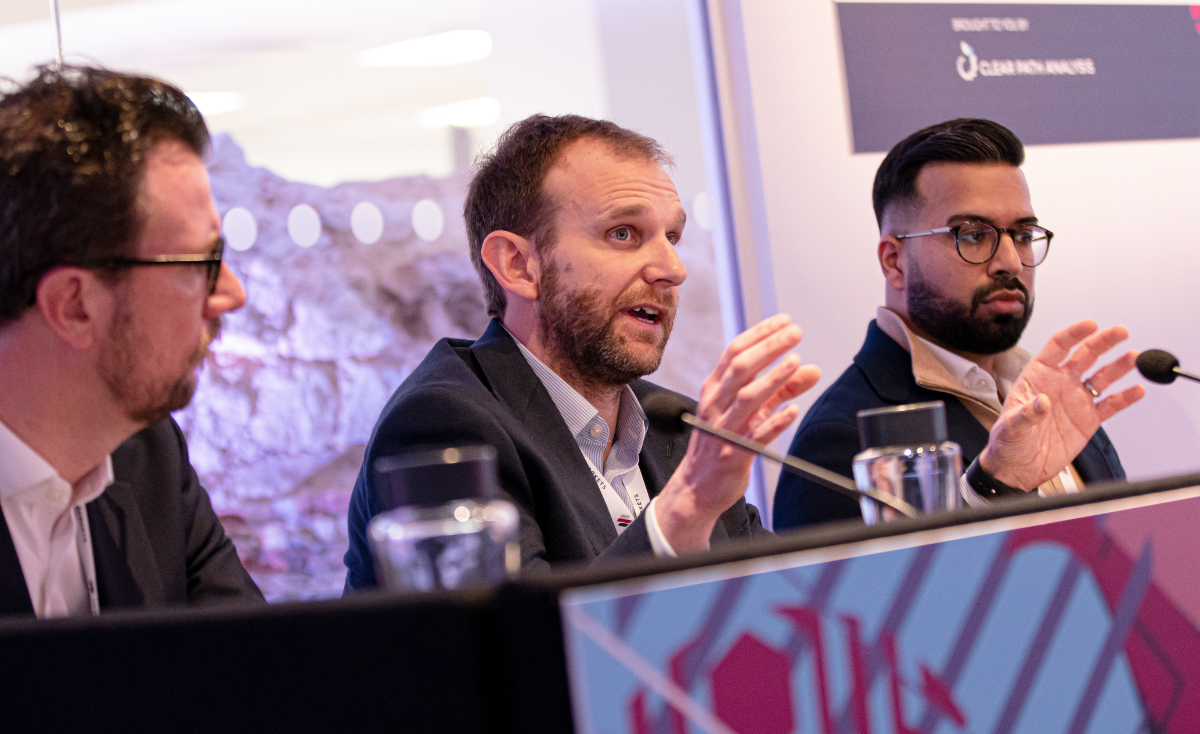Private Markets Investor Europe: How to approach digital transformation
A panel of senior investment operations figures discussed the different approaches to digital transformation in an ever-changing market on day one of Clear Path Analysis’s Private Markets Investor | Europe event in London.
Andrew Putwain POSTED ON 3/28/2023 3:07:33 PM
 Andrew Newman (L), EMEA Fund Chief Financial Officer, DWS, Tim Harrison (C), Head of Business Technology Partners, Intermediate Capital Group, and and Sahem Gulati (R), Head of Private Assets Strategy and Consulting, M&G.
Andrew Newman (L), EMEA Fund Chief Financial Officer, DWS, Tim Harrison (C), Head of Business Technology Partners, Intermediate Capital Group, and and Sahem Gulati (R), Head of Private Assets Strategy and Consulting, M&G.
Digital transformation
Several senior leaders in investment operations shared their views on the upcoming digital challenges stakeholders can expect in private markets in 2023 and beyond.
In the first panel discussion of the day at Clear Path Analysis’s Private Markets Investor | Europe 2023 event, moderator Crispian Lord, Partner, PwC, discussed different approaches to digital transformation alongside Sahem Gulati, Head of Private Assets Strategy and Consulting, M&G, Tim Harrison, Head of Business Technology Partners, Intermediate Capital Group, and Andrew Newman, EMEA Fund Chief Financial Officer, DWS.
“We’re investing heavily in data platforms in order to increase
high quality data reporting thought the firm."
The panel discussion focused on the shift to digitalisation in an ever-changing market, with Harrison saying that he saw a few key areas for immediate improvement. “We need workflow tools to support key operational processes, fund onboarding, and drawing down deals. These processes can be streamlined, and handoff points and collaborated tools between teams can be improved so that workflow is more seamless.”
He also specified that providing ad hoc access to data for users was important. This is because a common complaint asset managers encounter is that stakeholders are not able to access data that is locked away in systems, which goes hand-in-hand with establishing a strategic data platform. “We’re investing heavily in data platforms in order to increase high quality data reporting thought the firm,” he added. “Data is often locked away.”
The panellists said that mitigating these issues – specifically around data silos and the difficulties presented by legacy systems from disparate sections of companies - for example, those parts that were acquired and still run a separate data system – will improve operational resilience and make workflows more efficient.
Capture, organise, and report data
Another main issue the panel touched on was common difficulties encountered when it came to capturing, organising, and reporting on data – as well as extracting value from it.
"We know what we need to do from technology point-of-view in this area,
but there are limited resources, and the projects are time consuming.”
Harrison said that many firms, such as his, had grown but nonetheless still operated in data silos, which needed to be lessened or busted altogether so as to enhance reporting potential – and allow for strategy-agnostic practices. Harrison added that ESG metrics were a large part of shifting reporting trends, especially for clients. “We also need a consistent way of reporting ESG metrics across our portfolios. Whilst we know what we need to do from a data point of view, the challenge is time. It may mean choosing not to focus on certain older vintages and letting them run off,” he continued.
He said that better utilising third party and client data could help ease this burden, suggesting that data from third party vendors might allow the elimination of shadow accounts, or account duplicates. “We need a consistent way of reporting ESG and climate metrics. We know what we need to do from technology point-of-view in this area, but there are limited resources, and the projects are time consuming.”
On the topic of ESG, Gulati noted that it was an exciting development – but also said that it could lead to increasingly stretched resources. His firm, he added, outsourced their ESG data operations to a fund administrator. “It alleviates a lot of the administration burden for us,” he said.
Newman said he also saw this area as an opportunity for significant improvement, noting that Artificial Intelligence (AI) might have a big role to play in the future – especially with certain roles and repetitive tasks. “We hope to use AI to sift through our data, which could include new ideas such as finding correlations that may have originally been missed,” he added.
Data innovation is key
Innovation was needed to help drive efficiency as well as help with the ongoing trend of consolidation and increasing M&A activity.
“Private markets data is complex but not as profuse as public market data."
Harrison said he believed automation might help, particularly for sifting through and processing documentation. “It’s still in infancy but over next few years we’ll see widescale adoption, and we’ll continue to see innovation and tech vendors into this space that can help this.”
He added that being able to link more seamlessly across systems is an issue for the industry as a whole. “It’s the same with legal entities; it requires data mapping, and we need to make this as efficient as possible. Private markets data is complex but not as profuse as public market data."
Gulati said he felt the key was people – and most importantly strong partnerships. “We are identifying strategic partners to come up with long term solutions and often the challenge is people, so we need to see partnerships as expansion of the team,” he added.
“New innovations such as smart buildings means data comes directly from the building, which also helps in terms of climate data,” said Newman, when asked what trends he was happy to see gaining momentum.
All three panellists spoke about the burden of completing repetitive tasks and how more innovation coming down the pipeline should help to assuage this issue – but that companies needed to be open-minded and forward-looking to capture and use new technology correctly.
Without this mindset sinking in, they said, the issues and inefficiencies would continue.
Please Sign In or Register to leave a Comment.
SUBSCRIBE
Get the recent popular stories straight into your inbox







